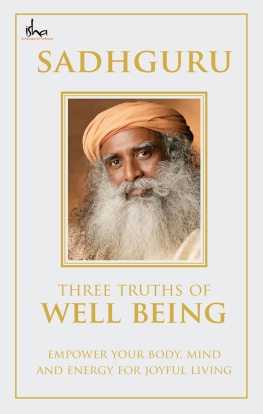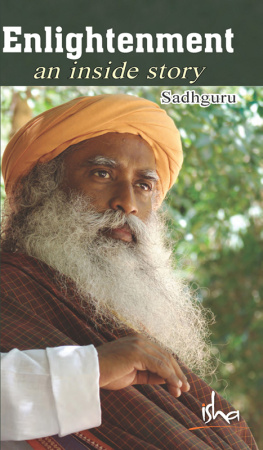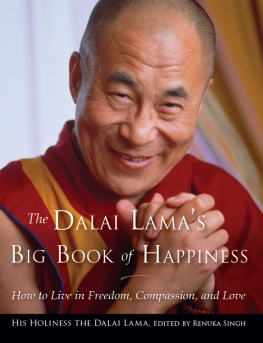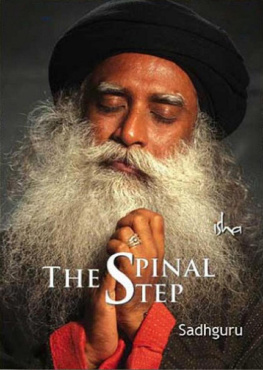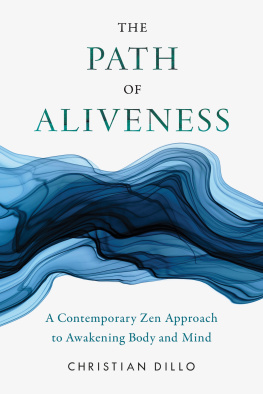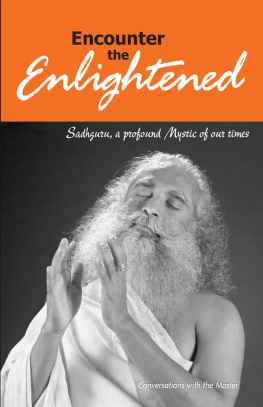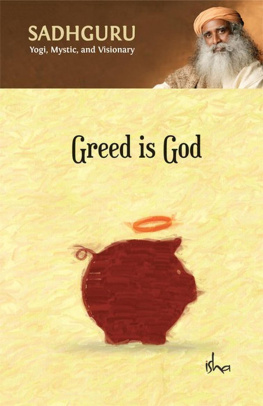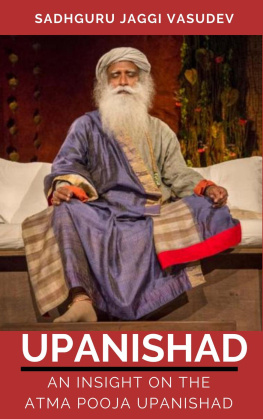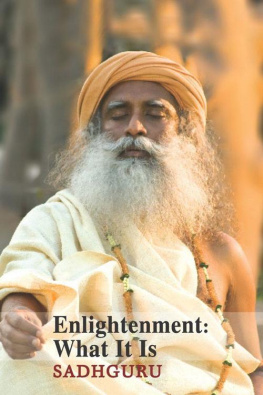Introduction
Sadhguru and a self-help book?It seems like an odd even outrageous proposition. Those familiar with his style know that Sadhguru doesnt give answers as much as provoke questions. He once described himself as a rough and tumble guru. And one can see why. Theres nothing chicken-soupy about Sadhguru. His approach is straight-talking, energetic, unsentimental. Far from avuncular. If you are thirsty and you ask me for water, I will put salt in your mouth because if you become thirsty enough you will find the source of water, he often says.
How then did this book happen?
Surprisingly, because Sadhguru agreed. I dont like saying no, he said simply when the idea was first mooted. He only laid down one precondition: dont dumb it down.
For those at the Isha Yoga Center who worked on this book, the challenge was considerable. For one, with his hectic schedule, Sadhguru doesnt have the time to write. This meant working largely with transcripts of his discourses, interspersed with conversations with him whenever possible. Transposing the spoken word on to the printed page wasnt easy. We decided to preserve the spoken flavour as far as possible. This may account for moments of awkward syntax and non-linearity. But the idea was to let readers feel his distinctive presence through the text. And the fluid patterns of a conversational mode seemed preferable to a more stilted correctness.
The other challenge was how to simplify without trivializing; how to be accessible without turning anaemic; how to reach a first-time reader without alienating those who know Sadhguru as a spiritual master and sage.
Sadhgurus wisdom encompasses the material and the mystical. How much of what to include was another question. It would be dishonest to present Sadhguru as either a New Age Life Coach or as a religious preacher. He is neither. He is a yogi. This means he is capable of sounding both logical and non-rational, uber-cool and ancient at the same time. He can be more irreverent than a diehard atheist. He can also be way more esoteric than your common or garden psychic.
But amputating the text to fit a readers comfort zone didnt seem like the answer. The Isha Publications team streamlined and pruned, keeping in mind the demands of the self-help genre. But the idea was also to retain some of the zigzag and freshness of a conversation with a mystic. The result is a book thats nifty and worldly and practical. Well being is the aim. But because it is Sadhguru, the book is also infused with an ancient yogic wisdom that compels us to reappraise fundamental ideas about being human and being alive. Hence the more esoteric moments with which this text is liberally peppered, particularly in the last section.
Perhaps the best way to describe Sadhguru is as an alchemist. Thats a key to reading this book. Dont be fooled by its simplicity. On the other hand, dont be daunted if some of the advice is challenging to implement. Somewhere along the way, youre likely to get the scent of something more than a heap of concepts, tips, anecdotes and jokes. That is the scent of a master. Someone capable not just of teaching, but of transforming. It is the scent that drew me to him many years ago. The scent of something real.
Yes, this is a self-help manual. Pragmatic. Do-it-yourself. Down-to-earth. There is an Isha Kriya CD at the close of it which is the most vital tool of self-empowerment that the book offers. You could try putting it into practice as often as you can. Its author says you can become the author of your own well being and that isnt an idle promise. The practice does bring clarity, aliveness, joy.
But since this is a book by a spiritual master, it is also a manual with a dash of grace. Allow the book and the CD to happen to you. And on those days when the self-help is hard going and the instructions feel like so many words on the page, allow the alchemy to take over. It works.
Arundhathi Subramaniam
Prologue
Joy for most people is a rare visitor in their lives. The intention of this book is to make joy your constant companion.
Joy is not a goal by itself. But it is a background milieu that is needed for any aspect of your life to happen wonderfully. Whether you eat, dance, sing, love, live or die, if it isnt there as a backdrop, you will have to drag your way through life. But once joy is your constant companion, life just breezes through you.

Four Idiots: The Yogic Way
The word yoga means, in your experience, everything has become one. Yoga means union.
It happened once. Four men were walking in the forest. The first was a gnana yogi, the second was a bhakti yogi, the third was a karma yogi, and the fourth was a kriya yogi.
Usually, these four people can never be together. The gnana yogi has total disdain for every other type of yoga. His is the yoga of intelligence, and normally, an intellectual has complete disdain for everybody else, particularly these bhakti types, who look upward and chant Gods name all the time. They look like a bunch of idiots to him.
But a bhakti yogi, a devotee, thinks all this gnana, karma and kriya yoga is a waste of time. He pities the others who dont see that when God is here, all you need to do is hold His hand and walk. All this mind-splitting philosophy, this bone-bending yoga, is not needed; God is here, because God is everywhere.
Then there is the karma yogi, the man of action. He thinks all the other types of yogis, with their fancy philosophies, are just lazy.
But a kriya yogi is the most disdainful of all. He laughs at everyone. Dont they know that all of existence is energy? If you dont transform your energy, whether you long for God or you long for anything else, nothing is going to happen. There will be no transformation.
These four people customarily cant get along. But today they happened to be walking together in the forest and a storm broke out. It grew very intense and began raining heavily. They started running, looking for shelter.
The bhakti yogi, the devotion man, said, In this direction there is an ancient temple. Lets go there. (Hes a devotee; he knows the geography of temples very well!)
They all ran in that direction. They came to an ancient temple; all the walls had crumbled long ago; just the roof and four columns remained. They rushed into the temple; not out of love for God, but just to escape the rain.
There was a deity in the centre. They ran towards it. The rain was lashing down from every direction. There was no other place to go, so they moved closer and closer. Finally, there was no alternative. They just hugged the deity and sat down.
The moment these four people hugged the idol, there was a huge fifth presence. Suddenly, God appeared.
In all their four minds the same question arose: Why now? They wondered, We expounded so many philosophies, did so many pujas, served so many people, did so much body-breaking sadhana (spiritual practice), but you didnt come. Now when were just escaping the rain, you turn up. Why?

